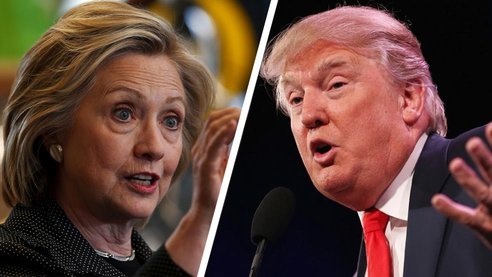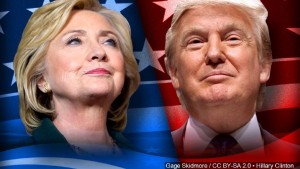
Neil A. Carousso produces NewsNation original “Kurt’s Country” – a celebration of country music and a slice of Americana with host Kurt Bardella.
-
Commander-in-Chief Comparison: Clinton vs. Trump
By Neil A. Carousso
It has been over 17 months since Hillary Clinton announced her candidacy for president of the United States of America while Donald Trump began his quest for the Republican nomination over 15 months ago. Since then, in two hard fought nomination processes, Mrs. Clinton and Mr. Trump have laid out their vision for America’s national security, which is arguably the most important issue the next president will face. Unfortunately, there have been many distractions and diversions away from important conversations of substance in favor of controversy, many of which have been exaggerated by both political establishments.
Here, let’s outline the Democratic and Republican nominees’ national security proposals.
On the Left
Former Secretary of State Clinton has been in politics in some capacity for roughly 33 years. Therefore, we can review her national security record, which is rather damaging and concerning to many Americans. In fact, according to the latest New York Times/CBS News Poll, Clinton’s untrustworthy rating has soared to a record 67 percent.
Clinton has been criticized by her own base for being a military hawk, with many young Americans embracing Senator Bernie Sanders’ (D-VT) “democratic socialism” philosophy, pushing Mrs. Clinton far left during the primaries. Clinton voted for the Iraq War as a senator and pushed for the U.S. Intervention in Libya as secretary of state. She supported the nuclear deal with Iran and lobbied President Barack Obama to take military action against Bashar al-Assaad in Syria. In March, at the American Israel Public Affairs Committee (AIPAC), Sec. Clinton never mentioned the plight of the Palestinians, which was brought up by Sanders at an April debate in Brooklyn, NY.
President Obama withdrew U.S. troops from Iraq in 2011, which allowed al-Qaeda to reemerge and rebrand as the Islamic State after being decimated in Iraq as a result of an increased military operation in 2007 along with Sunni Arab tribes.
Obama had rejected Clinton’s advice to sever Syria’s close ties with Iran, the largest state sponsor of terrorism, by being more aggressive towards Syria in order to protect civilians and allow for Syrian rebels to overthrow Syrian President Bashar Assad’s regime.
During the George W. Bush Administration, Libya’s leader Moammar Goddafi renounced its nuclear weapons program in 2003 and allowed the United States and Britain to destroy Libya’s nuclear weapons infrastructure. Libya had also renounced terrorism, turning over terror suspects.
In 2011, under the Obama Administration, the Arab Spring uprisings in Tunisia and Egypt spread to Libya. Gaddafi sought to forcefully end the revolt. Sec. Clinton, in working with NATO, launched a campaign to stop Gaddafi who was overthrown by Libya’s rebels. This result directly gave rise to al-Qaeda, which launched a terrorist attack that killed four Americans in Benghazi on September 11, 2012, including U.S. Ambassador Chris Stevens, Information Officer Sean Smith, and two CIA operatives, Glen Doherty and Tyrone Woods.
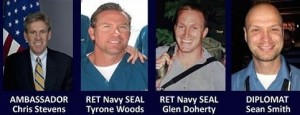
The American victims who died in Benghazi, Libya on September 11, 2012. In the days following the attack, Clinton and the White House incorrectly blamed the attack on a protest over an anti-Islam video, even while Clinton e-mailed her daughter Chelsea, under the pseudonym of “Diane Reynolds,” within hours of the attack, on her unsecured e-mail server, that the attacks were engaged by an “Al Qaeda-like group.” This mother-daughter exchange, revealed while Clinton was under oath in front of Congress on October 22, 2015, proved that Sec. Clinton misled the American people. The Benghazi attack was in fact a premeditated terrorist attack. Republicans saw this blatant coverup as a way for the Obama Administration to spin the narrative during a reelection campaign. Clinton famously remarked “What difference does it make?” when being questioned on whether or not she purposely misled the American people into believing the attack was a result of a anti-Islam video.
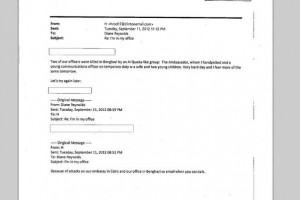
The e-mail from Hillary Clinton to her daughter Chelsea acknowledging the terrorist attack in Benghazi. 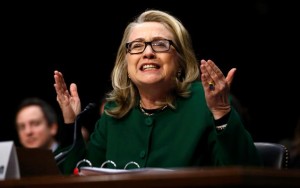
“What difference does it make?” Sec. Clinton testifying before the House Select Committee on Benghazi on October 22, 2015. (Courtesy: Jason Reed/REUTERS) Multiple investigations by Clinton’s State Department and the House Select Committee on Benghazi found that State failed to provide security at the diplomatic post in Benghazi while American troops begged for military support. The survivors of the Benghazi attack have told their story through the apolitical “13 Hours” film, detailing the horrific details of September 11, 2012.
Egypt had been ruled by President Hosni Mubarak for nearly 30 years. President Mubarak was a former general who cooperated with the United States and Israel on counterterrorism efforts, while crushing its opponents.
Mubarak was ousted by his own military in 2011 when the Arab Spring spread to Egypt. Clinton, in her memoir Hard Choices, said that she advised President Obama to move with caution toward Egypt. However, Obama, swayed by idealism, supported the democratic movement that overthrew Mubarak. Clinton’s State Department attempted to work with several political parties, including the Muslim Brotherhood, a previously outlawed group which sought to impose a radical Islamic ideology in place of a secular government. A political party, representing the Muslim Brotherhood, gained power in 2012.
Five months later, after Clinton’s departure from State, the government of Mohamed Morsi was overthrown in favor of a general, elected president under a “rigged” election, according to International monitors.
President Bush ordered the invasion of Iraq in 2003 in a post-9/11 America. While many consider the “Iraq War” a mistake, a war Clinton voted for, the presence of 145,000 U.S. troops reduced violence from an anti-U.S. insurgency. President Obama vowed during his presidential campaign of 2008 to bring the troops home, which he did in 2011.
Clinton unsuccessfully attempted to mediate between the Baghdad government and opposition groups. Her State Department failed to reach an agreement with Iraq’s government to provide legal protection for a small amount of U.S. forces to keep the peace in Iraq. This led to resurgence of violence and policies, imposed by the country’s Shiite majority, that alienated the Sunni Arab and Kurdish minorities.
This failed State Department initiative led to the rise of ISIS when the Sunni tribes that helped the U.S. military defeat al-Qaeda embraced the Islamic State fighters in 2014. Obama sent military trainers and advisors back to Iraq.
Iran had been pursuing a nuclear weapons research program and selling oil at a relatively steady rate during the Bush presidency, according to the United Nations nuclear watchdog agency. Obama and Clinton pursued strengthened international sanctions against Iran, while secretly pursuing a diplomatic solution to Iran’s nuclear threat, currently known as the “Iran Nuclear Deal.”
The harsh international sanctions, approved by Congress and the European Union, created dire economic conditions in Iran. China and Russia then joined the international sanctions, removing large markets for Iranian petroleum. While crude exports dropped in 2012 to its lowest level to 1986, Iran expanded its nuclear program.
The Iran deal was finalized under Clinton’s successor John Kerry in July 2015. While the U.N. says its implementation has kept Iran’s nuclear program peaceful, the largest state sponsor of terrorism has taunted U.S. Navy Ships and the Obama Administration has come under fire for making payments of $400 million and $1.3 billion to Iran days after they captured U.S. Navy officers.
Syria, a close ally of Iran, had been ruled under a brutal dictatorship under Assad and when the Arab Spring uprising in Syria led to civil war in 2011, Sec. Clinton saw it as an opportunity to disconnect Syria from Iran. While the U.S. ambassador to Syria encouraged Clinton and the Obama Administration to increase U.S. support to moderate Syrian rebel groups and impose a no-fly zone in Syria in order to prevent Assad’s air force from targeting civilians, President Obama rejected this advice. The Islamic State formed as a militant army that took control of territory in Syria that was vacated by retreating Assad troops.
Since then, the Islamic State has grown exponentially and the civil war has continued with over 400,000 deaths reported. In 2012, President Obama failed to follow through on his 2012 “red line” warning to Assad against the use of chemical weapons, but when he used them against rebels in 2013, the U.S. did not retaliate, sending the signal to the rebels that the U.S. would not support them. Since Clinton left office, though, Obama agreed to assist in training Syrian rebel groups to fight ISIS, but refuses to assist Assad.
The civil war has also posed a national security threat with hundreds of thousands of people fleeing to neighboring countries, creating a migrant crisis in Europe as well as fears and the reality of ISIS-inspired terrorism in Europe and the United States.
Clinton’s Handling of Classified Information
Moreover, Clinton said her lawyers “went through every single e-mail” to determine which e-mails were personal and which e-mails were work-related. Mrs. Clinton said they were “overly inclusive” in which e-mails were provided to the State Department. Comey revealed that the lawyers did not go through every e-mail; they instead used search terms to identify work-related e-mails, adding that it is “highly likely” they missed some. It was later revealed that Clinton’s team, one of which admitted under oath that he did not have security clearance to view the material, used “BleachBit” to permanently destroy e-mails.
It is believed by security experts that Clinton’s private email server faced hacking from Russia, Germany and South Korea and that Mrs. Clinton has made national security secrets vulnerable, potentially putting CIA operatives’ lives at risk. Clinton’s lack of transparency in many forms raises significant questions about her Commander-in-Chief credentials to possess such high government intelligence.
The Clinton Foundation and its Role in the State Department
Last month, the Associated Press wrote that “more than half the people outside the government who met with Hillary Clinton while she was secretary of state gave money — either personally or through companies or groups — to the Clinton Foundation. It’s an extraordinary proportion indicating her possible ethics challenges if elected president.” It indicates a pay-for-play environment whereby Clinton is being alleged to have given priority State Department meetings and considerations to those who donated to the Clinton Foundation.
In addition, her and her husband, President Bill Clinton, took exorbitant amounts of money from foreign nations such as Saudi Arabia, Jamaica, Kuwait, Qatar, the United Arab Emirates and the Sultanate of Omen who treat women as second-class citizens and impose harsh penalties, including death in the case of Saudi Arabia and the United Arab Emirates, for homosexuality.
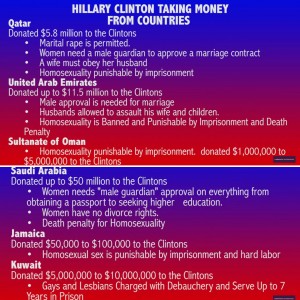
Nations the Clintons have taken money from, which include those who treat women as second-class citizens and impose harsh penalties for homosexuality Clinton’s National Security Vision for the Future
Mrs. Clinton has an extensive background in political office with a particularly damning and controversial national security record. However, as Commander-in-Chief, Clinton says she will intensify the “coalition air campaign against ISIS fighters, leaders and infrastructure.” Clinton said this month on NBC’s “Commander-in-Chief Forum” that she will not put troops on the ground in Iraq or Syria to combat ISIS. Clinton emphasizes for a need for a “diplomatic strategy” to resolve the Syrian civil war and the conflict between the Sunnis and Shias in Iraq.
Clinton says we must “stem the flow of jihadists from Europe and America to and from Iraq, Syria and Afghanistan” by working with our allies to cut off supplies, money and weapons as well as fighting radical propaganda online by intercepting communications.
As far as “hardening our defenses at home,” Clinton suggests we need to increase intelligence efforts to identify and stop terrorists, “stop gun sales to suspected terrorists” and increasing background checks on guns.
In terms of paying for our defense, Clinton says she will “prioritize defense reform initiatives” and maintain a limited military budget.
In fact, military spending “has fallen every year for four years since [2011] by a cumulative 15 percent,” under President Obama, according to PolitiFact. In addition, the U.S. has its smallest Navy fleet since 1917.
On the Right: Donald Trump’s National Security Vision
Mr. Trump, an entrepreneur and billionaire businessman, is considered a political outsider who is often praised for surrounding himself with the “best” advisors. He has assembled a team of national security advisors, including General Michael Flynn, former New York City Mayor Rudy Giuliani, Alabama Sen. Jeff Sessions, counter-terrorism expert Walid Phares, energy consultant George Papadopoulos, former Defense Department inspector general Joe Schmitz, managing partner of Global Energy Capital Carter Page and former Lt. Gen. Keith Kellogg.
Trump emphasizes the need for an “America First” policy, including securing America’s borders by building a wall on the Southern Border and enforcing current immigration laws to end the flow of illegal immigration and illicit drugs from flowing into the United States. Trump vows to triple the amount of Immigration Customs Enforcement (ICE) officers to detain and return all criminal illegal immigrants, put an end sanctuary cities, crack down on immigrants who overstay their visas and cooperate with local gang task forces to apprehend and deport illegal aliens in gangs. Trump’s policy is that of enforcing already existing laws to minimize the threat from illegal immigration crime and “lawlessness” to encourage people who “love” and respect America to enter the country legally. “This will be funded by accepting the recommendation of the Inspector General for Tax Administration and eliminating tax credit payments to illegal immigrants,” according to Trump via his campaign website.
As far as ISIS is concerned, Mr. Trump promises to “knock the hell out of them” by any means necessary, including the possibility of ground troops and air strikes. Trump, in criticizing politicians’ policies that are too transparent, states that he will not reveal specifics in order to refrain from telegraphing his strategy to the enemy. While Trump says he has a plan, if elected, he would give the Pentagon 30 days to present a plan for destroying the Islamic State and then he will compare plans and review all his options to defeat radical Islamic terrorism.
Mr. Trump laid out plans earlier this month to jettison current defense-spending caps and increase the size of our “depleted” military. The Republican nominee said he wants to boost the number of active Army troops from 490,000 to 540,00, build a Navy of 350 surface ships and submarines, up from 275 current ships, add about 100 fighter craft to the Air Force to bring the total to 1,200 and grow the number of Marine Corps battalions from 23 to 36, or an extra 12,480 troops.
Trump emphasizes the need to work with our allies like Israel. However, Trump does not believe in interfering in nations’ disputes besides our own unless it presents a need for American involvement for the safety of our country and the world.
Hillary Clinton and Donald Trump will debate for the first time on Monday, September 26 at Hofstra University.


